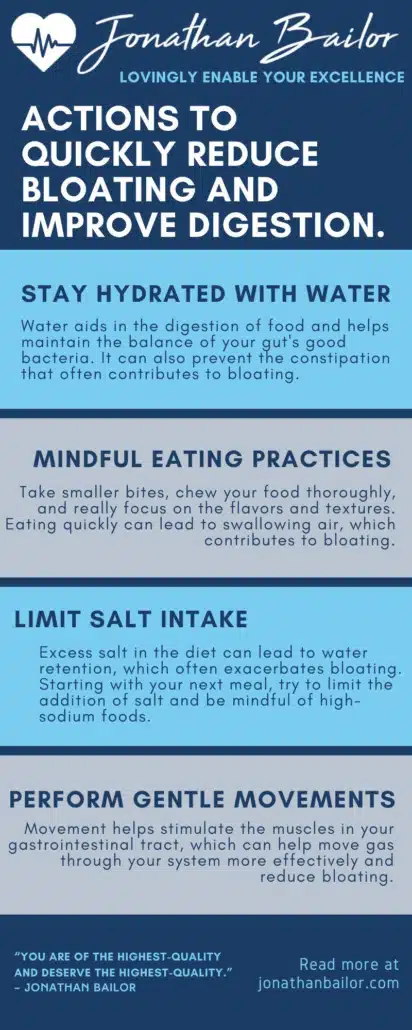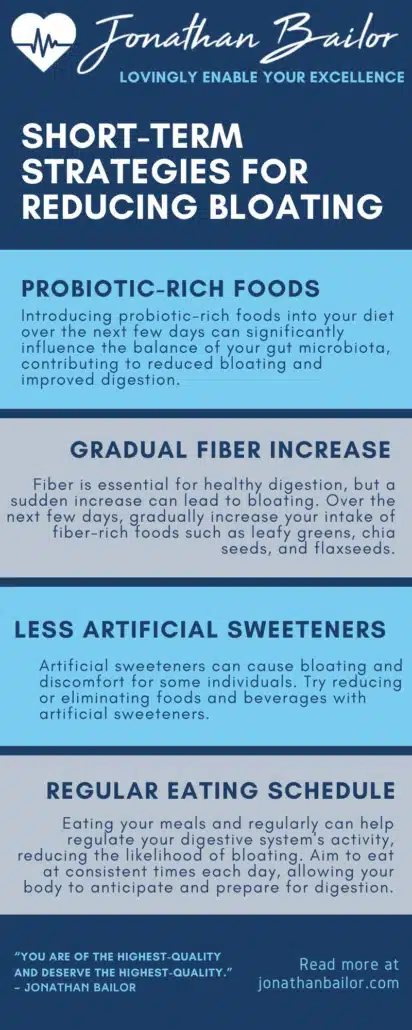16 Ways to Reduce Bloating and Boost Gut Health Throughout Life
Bloating and gut discomfort don’t have to be an inevitable part of your day-to-day life, regardless of your life stage. Imagine enjoying your favorite meals and activities without the lingering worry of discomfort that often follows. It’s not only possible; it’s within your reach. This Gut Health Guide by Jonatha Bailor is tailored to unveil practical and effective strategies that harmonize with your body’s natural rhythm, fostering a supportive environment for optimal gut health and minimizing bloating, a common concern that many share but few know how to address effectively.
The journey to a happier, healthier gut is more straightforward than you might think. It’s about making small, manageable adjustments to your daily routine that collectively make a significant impact. Think of it as nurturing a garden; it flourishes with the proper care and conditions.
Your digestive system is no different. It thrives on balance, care, and attention to detail. By adopting a few key habits, you can cultivate a gut environment that supports your overall well-being, allowing you to lead a more comfortable and fulfilling life.
Sharing this knowledge feels like passing on a secret that shouldn’t be kept. It’s about empowering one another with the tools to take control of our digestive health and making informed choices that resonate well beyond the dinner table.
So, whether you’re looking to support a loved one or enhance your well-being, this article is designed to be your companion on the path to digestive comfort and vitality.
Share it with friends and family on social media or via email, igniting a conversation about gut health that could benefit many. Let’s take this journey together, embracing each step towards a healthier and more energized life.
Immediate Steps to Reduce Bloating and Enhance Gut Health
In the quest for improved gut health and the alleviation of bloating, certain steps can be taken immediately to foster comfort and well-being. These adjustments are simple yet profoundly effective, designed to offer relief and support to your digestive system without delay.
Each suggestion provided here can be implemented right now, offering you the opportunity to experience changes in how you feel in the shortest time possible.
Let’s explore these immediate actions that serve as the building blocks for a healthier, more comfortable digestive experience.
1. Stay Hydrated with Water
Increasing your water intake is a swift and effective way to support your body’s digestive process. Water aids in the digestion of food and helps maintain the balance of your gut’s good bacteria. It can also prevent the constipation that often contributes to bloating.
Starting now, make a conscious effort to drink a glass of water every hour or keep a water bottle handy throughout the day. This simple act can significantly improve your gut health and reduce feelings of bloating.
2. Mindful Eating Practices
Begin practicing mindful eating during your next meal. Take smaller bites, chew your food thoroughly, and really focus on the flavors and textures. Eating quickly can lead to swallowing air, which contributes to bloating.
By slowing down, you not only enjoy your meals more but also facilitate easier digestion and absorption of nutrients, reducing the likelihood of discomfort after eating.
3. Limit Salt Intake
Excess salt in the diet can lead to water retention, which often exacerbates bloating. Starting with your next meal, try to limit the addition of salt and be mindful of high-sodium foods.
Opting for fresh foods over processed options can dramatically reduce salt intake, offer immediate relief from bloating, and support overall gut health.
4. Incorporate Gentle Movement
A brief walk or gentle stretching can have an immediate effect on alleviating bloating. Movement helps stimulate the muscles in your gastrointestinal tract, which can help move gas through your system more effectively and reduce bloating.
After your next meal, commit to a short walk or light stretching to encourage digestive comfort and ease.
By adopting these immediate changes, you’re taking significant steps towards supporting your gut health and reducing bloating. These practices are not only effective but also simple to integrate into your daily routine, offering a pathway to enhanced digestive well-being that begins right now.
Embrace these changes with openness, and notice the positive impacts they can have on your comfort and overall health.

Feeling Better Is Priceless, That's Why We Don't Put A Price On It!
“It’s Like A Free and Medically Valid Version of Noom and Weight Watchers Online”
~ Dr. Doctor Matthew Oleshiak, MD
Click the 'LEARN MORE' button below for free lifetime access to the fast fix program developed by Jonathan and top Ivy League Medical Doctors
LEARN MOREP.S. It's not a free trial. It's not part of the program for free. The entire program is free, forever, for real! No credit card needed.
Short-term Strategies for Reducing Bloating and Enhancing Gut Health
As we navigate the journey toward improved gut health and the reduction of bloating, the transition from immediate actions to short-term strategies marks a significant step forward. Over the course of a few days, implementing specific changes can profoundly influence how your digestive system functions, bringing about a noticeable difference in comfort and overall well-being. These short-term changes are designed to build upon the immediate adjustments, deepening their impact and setting the stage for lasting gut health improvements.
Let’s explore these actionable steps you can start today and see benefits within a few days.
1. Experiment with Probiotic-rich Foods
Introducing probiotic-rich foods into your diet over the next few days can significantly influence the balance of your gut microbiota, contributing to reduced bloating and improved digestion. Foods like kefir, kimchi, sauerkraut, and live-cultured yogurt are excellent sources of probiotics. Begin by incorporating small servings of these foods into one meal a day and observe how your body responds.
This gradual introduction allows your gut to adjust to the beneficial bacteria, enhancing your digestive health.
2. Gradual Fiber Increase
Fiber is essential for healthy digestion, but a sudden increase can lead to bloating. Over the next few days, gradually increase your intake of fiber-rich foods such as leafy greens, chia seeds, and flaxseeds. Start with a small additional serving per day, allowing your digestive system to adjust without overwhelming it.
This careful increase in fiber can improve regularity and reduce bloating as your body adapts.
3. Reduce Artificial Sweeteners
Artificial sweeteners can cause bloating and discomfort for some individuals. Over the next several days, try reducing or eliminating foods and beverages containing artificial sweeteners. Pay attention to labels on packaged foods and drinks, as these sweeteners are often hidden in products marketed as “diet” or “low-calorie.”
Monitoring how your body responds to this change can provide insights into whether artificial sweeteners may contribute to your bloating.
4. Establish a Regular Eating Schedule
Eating your meals and snacks regularly can help regulate your digestive system’s activity, reducing the likelihood of bloating. Over the next few days, aim to eat at consistent times each day, allowing your body to anticipate and prepare for digestion.
This consistency can help improve gastrointestinal motility and reduce gas buildup, leading to less bloating.
By adopting these short-term strategies, you’re not only addressing the symptoms of bloating but also nurturing your gut health from within. These changes, implemented over the next few days, can pave the way for a more comfortable and harmonious digestive experience.
As you make these adjustments, listen to your body’s signals and give yourself the time to adapt, recognizing these efforts as valuable steps toward lasting gut health.

Medium-term Adjustments for Sustained Gut Health and Bloating Relief
As we progress further on our journey towards achieving a balanced digestive system and minimizing bloating, the focus shifts towards medium-term adjustments. These changes, aimed at enriching gut health over a few weeks, are designed to solidify the foundation laid by immediate and short-term strategies.
Implementing these adjustments requires a commitment to nurturing your gut over time, allowing your body to fully adapt and reap the benefits.
The following medium-term changes are crafted to enhance gut health further, offering a deeper level of care and attention to your digestive well-being.
Let’s explore these strategies that, with dedication and consistency, can transform your gut health within weeks.
1. Regular Exercise Routine
Establishing a regular exercise routine can significantly improve gut mobility and reduce bloating. A healthy fitness routine should include a variety of exercises that focus on cardiovascular health, strength training, and flexibility.
Consistent physical activity, at least three to four times a week, can enhance blood flow to the digestive tract and encourage the movement of gas through your system, reducing bloating and discomfort.
This routine doesn’t need to be intense; moderate, enjoyable activities are key to maintaining consistency and supporting your gut health.
2. Mindful Stress Management
Stress is closely linked to digestive health, with chronic stress potentially exacerbating bloating and gut discomfort. Over the next few weeks, focus on incorporating stress-reduction techniques into your daily routine.
Practices such as meditation, deep-breathing exercises, or gentle yoga can help manage stress levels, positively impacting your gut health.
Dedicate a few minutes each day to these practices, gradually building a habit that supports both mental and gut well-being.
3. Experiment with Elimination Diets
Sometimes, specific foods can trigger bloating and digestive issues. Over the next few weeks, consider experimenting with an elimination diet to identify potential food sensitivities. Start by eliminating common triggers such as dairy, high-fructose fruits, or certain vegetables. After a period of avoidance, reintroduce these foods one at a time, noting any changes in symptoms.
This systematic approach can help pinpoint specific foods that may be affecting your gut health, allowing you to make informed dietary choices moving forward.
4. Enhance Meal Preparation Practices
Taking control of your meal preparation can profoundly impact your gut health. Over the next few weeks, focus on preparing meals rich in gut-friendly ingredients such as lean proteins, a variety of vegetables, and healthy fats.
Cooking at home allows you to ensure the freshness of ingredients and avoid hidden additives that may contribute to bloating. Experiment with new recipes that incorporate probiotic and prebiotic foods, making mealtime both a nourishing and enjoyable experience.
By embracing these medium-term adjustments, you’re not just treating symptoms; you’re investing in the long-term health and balance of your gut. These strategies, implemented over the coming weeks, are steps towards a lifestyle that supports digestive wellness and overall health.
As you integrate these changes, remember that consistency is key, and the rewards for your dedication are a more comfortable, bloated-free life and a resilient digestive system.

Long-term Commitments for Optimal Gut Health and Bloating Reduction
Embarking on a journey towards enduring gut health and the alleviation of bloating requires not only immediate and medium-term changes but also a vision for the long haul. These long-term commitments are about integrating deeper, sustainable practices into your lifestyle that honor your body’s natural rhythms and contribute to a thriving digestive system over months and beyond.
Such adjustments demand patience, perseverance, and a profound connection with your body’s needs, laying the groundwork for lasting well-being.
Here, we delve into strategies designed for those ready to make a lasting impact on their gut health, focusing on changes that foster a balanced and bloated-free existence.
1. Cultivate a Diverse Microbiome
Over the coming months, focus on diversifying your gut microbiome, a key factor in digestive health. This involves consuming a wide range of fiber-rich vegetables, fruits, and fermented foods to nourish different bacterial species within your gut.
Embracing variety in your diet not only combats bloating but also strengthens your gut barrier, reducing inflammation and enhancing nutrient absorption. This diversity also supports immune function, demonstrating the wide-reaching benefits of a well-balanced microbiome.
2. Build a Resilient Stress Management Toolkit
Long-term gut health is intricately linked to how we manage stress. Over the next several months, build a resilient stress management toolkit beyond daily exercises. This might include cultivating hobbies that relax and fulfill you, seeking support through therapy or counseling, and setting healthy boundaries in both personal and professional life.
A holistic approach to stress management can mitigate its impact on your gut, leading to sustained improvements in digestive comfort and overall health.
3. Establish Consistent Sleep Patterns
Prioritizing and establishing consistent sleep patterns is crucial for gut health. Strive to get 7-9 hours of quality sleep per night and establish a consistent sleep schedule that aligns with your body’s natural circadian rhythms. Sleep profoundly impacts gut health, influencing everything from the microbiome to the body’s stress response.
Establishing a regular sleep schedule supports the restoration of your gut lining and reduces the risk of inflammation, contributing to long-term digestive well-being.
4. Commit to Lifelong Learning and Adaptation
As you navigate through the months and years, commit to a mindset of lifelong learning and adaptation in relation to your gut health. Stay informed about the latest research and be open to adjusting your habits as new insights emerge. This might involve periodically revisiting your diet, stress management techniques, and exercise routines to ensure they align with your body’s evolving needs.
By staying curious and adaptable, you can fine-tune your approach to gut health, ensuring it remains effective and sustainable over the long term.
These long-term commitments signify a profound dedication to your gut health and overall well-being. By implementing these strategies, you’re not only addressing the symptoms of bloating and digestive discomfort but also nurturing your body in a way that promotes vitality and resilience.
Embrace this journey with patience and optimism, knowing that the choices you make today are investments in a healthier, more vibrant tomorrow.

Gut Health FAQ: Navigating Through Common Inquiries
In the pursuit of achieving optimal digestive well-being, many questions arise regarding how best to nurture and maintain a healthy gut.
Below, we address some of the most frequently asked questions, offering insights into the foundational aspects of gut health. These answers aim to guide you through common concerns, illuminating the path towards a balanced and thriving digestive system.
Q1: What are the signs of an unhealthy gut?
An unhealthy gut may manifest through a variety of symptoms that can affect your overall well-being. Common indicators include digestive discomfort such as bloating, gas, diarrhea, constipation, and heartburn.
Beyond the digestive tract, signs can extend to fatigue, skin irritation, unwanted weight changes, and mood fluctuations. These symptoms are your body’s way of signaling imbalances within your digestive system, prompting attention towards gut health.
Q2: How does stress affect my gut health?
Stress significantly impacts gut health by influencing the gut-brain axis, a complex communication network linking your digestive system and brain. Under stress, the body’s response can alter gut motility, increase gut permeability (sometimes called “leaky gut”), and disturb the balance of gut bacteria. These changes can lead to symptoms of discomfort and may exacerbate conditions like irritable bowel syndrome (IBS).
Managing stress through mindfulness, adequate rest, and relaxation techniques can help mitigate its effects on the gut.
Q3: Can probiotics improve my gut health?
Probiotics, often called “good” bacteria, play a crucial role in maintaining gut health by supporting a balanced microbiome.
Incorporating probiotics through fermented foods such as yogurt (with live cultures), kefir, sauerkraut, and kimchi, or high-quality supplements can contribute to the diversity and balance of gut flora. This, in turn, can aid digestion, enhance nutrient absorption, and bolster the immune system.
It’s important to choose probiotics wisely and consider consulting a healthcare professional for tailored advice.
Q4: What role does fiber play in gut health?
Fiber is fundamental to gut health, serving as a primary food source for beneficial gut bacteria. The fermentation of fiber by these bacteria produces short-chain fatty acids, compounds critical for gut lining health and inflammation reduction.
A diet rich in diverse sources of fiber, such as leafy greens, non-starchy vegetables, nuts, and seeds, can help promote regular bowel movements, prevent constipation, and maintain a healthy gut microbiome. It is advisable to increase your fiber intake gradually, so that your digestive system can adjust comfortably.
Q5: How can hydration affect digestive health?
Adequate hydration is vital for maintaining optimal digestive health. Water facilitates the digestion of food and the absorption of nutrients while also ensuring smooth transit through the gut, preventing constipation. It aids in the dissolution of soluble fiber, allowing it to benefit gut motility and microbial health.
Consistently drinking sufficient amounts of water throughout the day supports your gut’s ability to function efficiently and contributes to overall digestive well-being.
By addressing these common inquiries, we hope to provide you with a clearer understanding of gut health and its profound influence on your physical and emotional state.
Remember, nurturing your gut health is a step towards enhancing your overall quality of life, underscoring the importance of a balanced diet, stress management, and mindful living practices.
Embracing a Future of Gut Health and Vitality
In our comprehensive exploration of gut health, we’ve navigated through the immediate, short-term, medium-term, and long-term strategies that foster a thriving digestive system and mitigate bloating.
This journey underscores the importance of a holistic approach, embracing changes that resonate with our body’s innate wisdom. Consider this guide not just as a personal blueprint but as a shared resource in your journey toward digestive well-being.
Invite friends and family to join in by sharing this knowledge on social media and via email. Together, let’s cultivate a community committed to nurturing gut health and enhancing our collective vitality.
Feeling Better Is Priceless, That's Why We Don't Put A Price On It!
“It’s Like A Free and Medically Valid Version of Noom and Weight Watchers Online”
~ Dr. Doctor Matthew Oleshiak, MD
Click the 'LEARN MORE' button below for free lifetime access to the fast fix program developed by Jonathan and top Ivy League Medical Doctors
LEARN MOREP.S. It's not a free trial. It's not part of the program for free. The entire program is free, forever, for real! No credit card needed.




